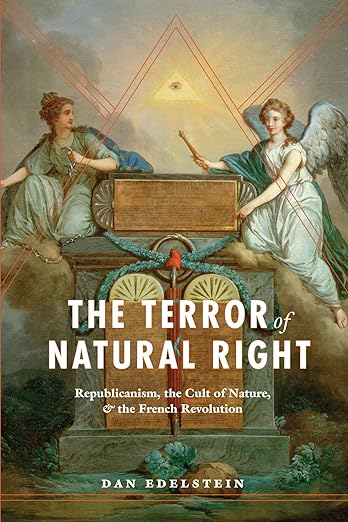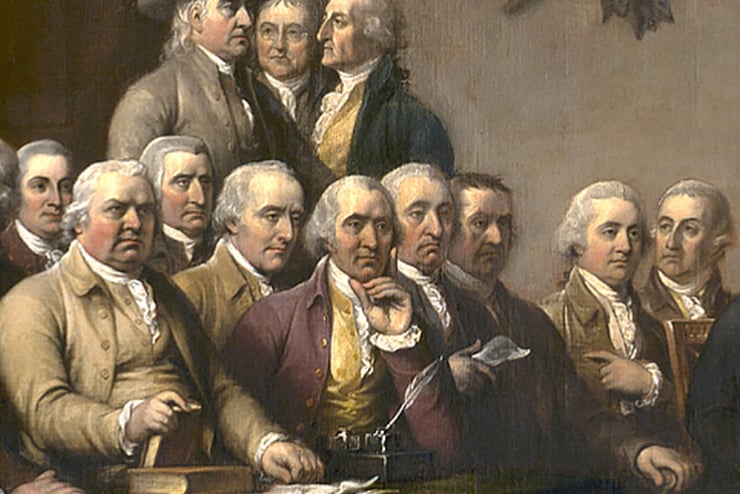A rejoinder to Michael Anton’s reply
Michael Anton has reiterated his deep, passionate belief in “natural right” but (alas!) has still not convinced me that I must embrace this idea for the greater social good. I’m also not sure why American youth would find his belief more compelling than other commitments inherited from the past, for example, belief in the Bible as a divinely revealed document or in America’s constitutional foundations.
Supposedly something called “modernity” requires us to opt for Mr. Anton’s answer to social dissolution. The American conservative establishment and Republican talking heads seem to agree with him. They have placed so much rhetorical effort in pushing the idea of inborn individual rights that every time I flip on Fox News someone is solemnly proclaiming a “God-given right.” Whether this has been a wise investment of effort is doubtful, since our ascribed or claimed natural rights continue to multiply, but not always in a way that would please Mr. Anton. Some establishment conservative commentators have been lately characterizing gay marriage as an inborn individual right, and I’ve no doubt that this exercise of choice is already joining the laundry list of the conservative movement’s inalienable rights.
I fully understand the distinction Mr. Anton is drawing between natural right as something that is attached to us by an authority outside of ourselves and which we discover through investigation, and mere “rights” that we presumably invent for ourselves. But like traditional religion, his concept rests on a leap of faith, and its content, as I have already explained, is far from self-evident. Why should his tradition seem more convincing than other traditions that have fallen out of favor? I doubt that his metaphysic of natural right is more compelling to the American public than my invocation of history and tradition. The moral foundations of the American nation were in reality shaped by religion and custom, not by an Enlightenment contrivance.
Mr. Anton is correct that it’s highly unlikely that an early American political figure who invoked natural right would have included gay marriage among his list of inborn human rights. But a progressive today can legitimately argue from a natural right perspective that this may be attributable to our ancestors’ lack of imagination or to a failure to grasp the full implications of natural right thinking. In the present age, the notion of inborn individual rights has led more often in a progressive direction than a conservative one. Furthermore, the revulsion of the 18th-century American for the idea of gay marriage likely came from his biblical morality, not from declarations of natural rights in the political documents of the time. His morality had a deeper and, in the 18th century, more prevalent source independent of talk about natural rights.
Although Mr. Anton would insist that he and other disciples of Harry Jaffa, often grouped together as the Claremont School or West Coast Straussians, represent the true natural right position, he indiscriminately throws together all the political persuasions that challenge his doctrine presumably from the right. Thus, he groups paleoconservatives with the integralists such as those at Compact, although we have absolutely nothing to do with that school of thought, save for our skepticism about natural right thinking.
The Compact crowd rejects natural rights as incompatible with their supposedly neomedieval concept of the state. Our own rejection of natural rights is based on historical conservatism and on our belief in the need for an intergenerational continuity of legal and social traditions. Paleoconservatives view individuals primarily as members of communities and nations rather than as bearers of rights that emerged from an imaginary state of nature, and which stick to atomized persons independently of a social and cultural context. We also believe that today’s leftists can be resisted more effectively by cohesive communities than by self-proclaimed individuals insisting on their rights and their personal independence.
There should be nothing surprising about my being influenced by Hobbes, who has attracted a wide range of interpreters. These include Michael Oakeshott, who viewed Hobbes as the creator of a purely utilitarian notion of sovereignty; Carl Schmitt, who characterized Hobbes as the father of the modern state; Ferdinand Tönnies who presented Hobbes as a forerunner of progressive, scientifically oriented democratic government; and Howard Warrender, who treated Hobbes as a conflicted scholastic who dredged up Christian Aristotelianism in a form adapted to the “new science” of his time. Many of Hobbes’s key interpreters were less interested in his role as a predecessor of John Locke than as a thinker in his own right. They focused on his analysis of sovereignty, his attempt to find a path leading out of the age of religious wars, and his understanding of the concept of “commonwealth.” If my reading of Hobbes’ Leviathan seems selective, then this would be true for other interpreters. In other words, Mr. Anton and other Claremonters have their own Hobbes; I am entitled to mine.
Accepting the notion that humans share a “fundamental impulse to defend themselves and their lives from physical attack” does not require me to accept the idea that individuals are born with personal rights independently of their social and historical circumstances. It is to acknowledge a minimal requirement that the state must meet to elicit my obedience. No government anywhere deserves our loyalty that lacks the interest or capability of defending us. This condition is implicit in all feudal relations, and there are numerous premodern references to this fundamental political obligation summarized in the Hobbesian formula: obedience in return for protection. It does not seem inconsistent to affirm this principle without embracing Mr. Anton’s metaphysic of natural right.

Indeed, there may be dangerous consequences if a natural right philosophy becomes tantamount to a political religion. Stanford historian Dan Edelstein has written a book and a number of articles documenting the influence of natural right thinking on the terror unleashed by the French Revolution. Those who were accused of resisting those rights that the revolutionaries believed came out of Nature, and which supposedly belonged to citizens of the republic, were jailed and often killed. According to Edelstein, there is no demonstrable correlation between regimes stressing natural rights (as opposed to rights that come out of inherited traditions, or what Burke called prescribed and entailed rights) and the achievement of civil tranquility. A civil religion based on natural right can breed intolerance and aggression, and we are now living through a woke dictatorship that also claims to be based on rights.

Leave a Reply